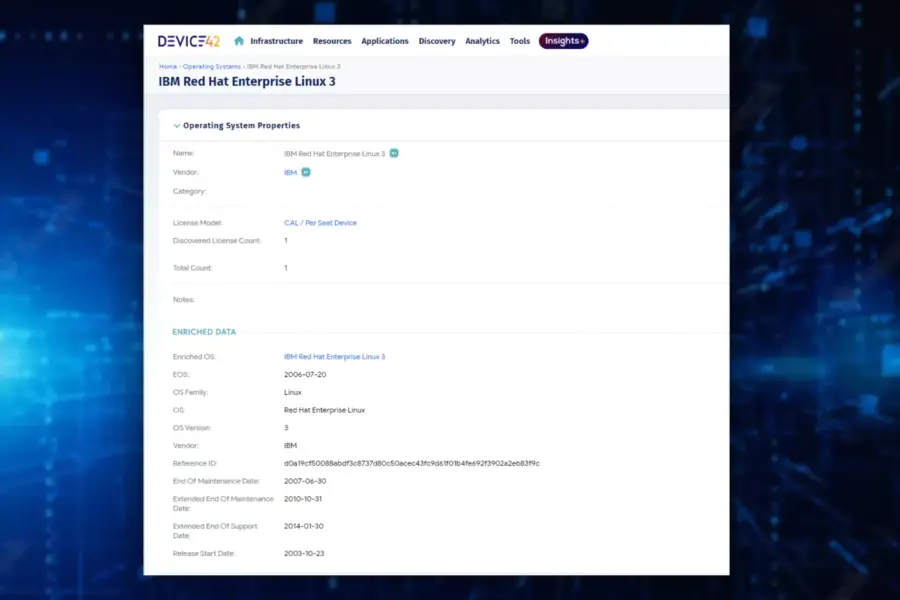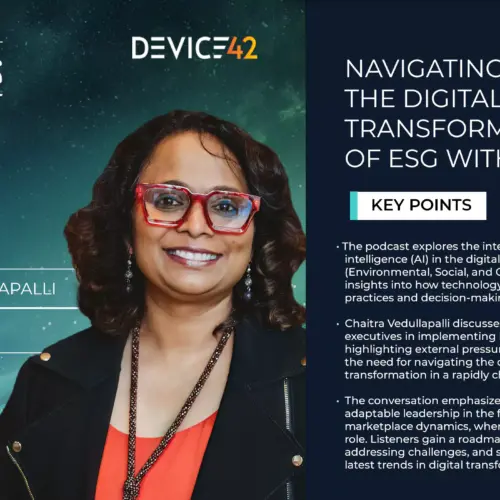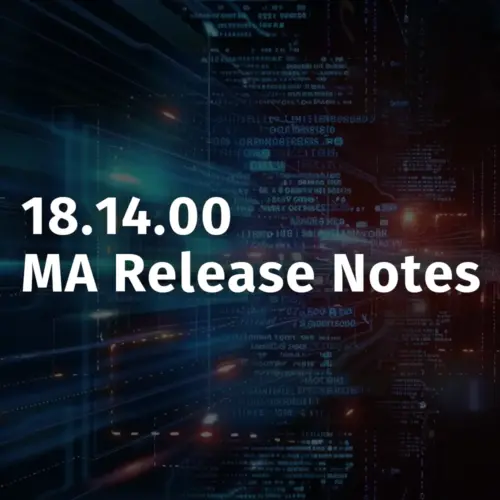V18.12.00 – MA Release Notes
Release Date: December 6, 2023
Release Overview
New in version 18.12.00 are improvements to EnrichAI data. Enriched Operating System (OS) and Vendor names will be stored in main fields – instead of as supplemental data – to enable reports, API calls, views, and queries to retrieve the enriched data. Furthermore, EnrichAI will now retrieve key vendor support dates for OSs, if the information is available.
The Discovery Hub has been enhanced with configurable CIDR block options to improve data quality and consistency when running autodiscovery jobs.
In addition to the above, the v18.12 update includes:
- UCS discovery now reveals network connectivity, expanding beyond Chassis and Blade relationships
- The inclusion of database connection sampling to Periodic Jobs.
- A signed Mac agent to ensure trusted information is collected on Mac devices in networks.
- A progress indicator for update uploads.
- Improvements to the AutoClean feature with the addition of Software Components and Subnet configuration items, and the option to disable Administrator object accounts.
- The adoption of our improved list page interface to the Notification, Ignored Service, and History list views.
- For some PDU discoveries, port type was not being discovered. This is now fixed.
- Various other SNMP discovery related fixes have been added.
We’ve also fixed a range of bugs like fixes to the `software_details` API, lifecycle events API, and `Bios_Vendor` reporting. Oracle user discovery and Oracle cloud discovery issues were fixed. Network and IP management issues, user interface bugs, and the failure of device archiving issues were some of the issues also addressed.
Enrich AI Operating System/Vendor Standardization
Starting with the 18.04 release, Device42 began enriching data that was stored as part of discovery. This enriched data supplemented the discovered OS and Vendor by providing additional fields containing standardized names of the Vendor and OS. The standardized text values of OS and Vendor names appeared in addition to the discovered values, providing the ability to accurately track inventory and licensing counts.
In the latest v18.12 update, these enriched fields of OS Name and Vendor Name will be stored in place of the traditional fields rather than as supplemental data. This will enable existing reports, API calls, views, and queries to retrieve the enriched data.
Note: If the data for Operating System and Vendor is populated from Enrich AI, these values cannot be changed through edit operations. An icon will be displayed when the values are being populated through enrichment to signify that the value has been set by EnrichAI and cannot be changed. In addition, the enrichment and standardization can be disabled by unchecking the “Don’t change via API” option of the device. Find this setting when editing the device properties.
EnrichAI Integration Option
The Cloud Services page can be used to disable the EnrichAI integration option to revert to discovered or manually entered data exclusively. Select Tools > Cloud Services to display the page and then click Edit if you want to make changes. Click disable and then click Save to disable the service. You can enable the service again at any time.
Device42 checks your license and registration status to determine whether Cloud Services are Ready. Contact [email protected] if your Cloud Services are not ready.
Enrich AI Key OS Support Dates
In addition to OS and Vendor names, EnrichAI will retrieve key support dates for Operating Systems. These dates are gathered from authoritative sources and displayed as part of the Operating System properties.
Key support dates vary by OS vendor and not all of them may be provided. The following dates may now be populated by EnrichAI:
- Base Release Date – Date when OS became available
- Release Start Date – Date support started for the OS release
- Release End Date – The date support ended for the release
- End of Life Date – Date when the OS is no longer sold
- End of Support Date – Date when mainstream support ends
- Extended End of Support Date – Date when extended support ends
- End Of Maintenance Date – The date when no more patches will be released under a standard maintenance agreement
- Extended End Of Maintenance Date – The date when no more patches will be released under an extended maintenance agreement
Since vendors may utilize a subset of these dates, only those fields with a valid entry will be displayed within the OS properties. If one of the above dates is not listed for the OS, the date is either not used by the vendor, the date has not been set and will be in the future, or no date can be found from an authoritative source.
Note: Upon upgrading to v18.12, all previous EnrichAI values for OS and Vendors will be removed. After running subsequent discovery jobs, these values will be retrieved, populated, and retained. This is done to improve data quality as EnrichAI data sources have been enhanced in v18.12.
Discovery Hub CIDR Blocks in Jobs
In v18.12.00 you now have configuration options when moving your Hub scan data into Discovery Jobs. You can move the information found in the scan, the found information plus anything that comes in during scheduled scans, or pull in the entire CIDR block. The latter two options are recommended to consistently bring in accurate data when running your discovery jobs.
UCS Blades and Connectivity
UCS discovery has been expanded to bring in network connectivity data. Previously we would only retrieve Chassis and Blade relationships for UCS clusters, but now we’re expanding on that to show connectivity between cluster elements with port channel aggregation information.
Now you can get an overview of connectivity in your entire cluster.
Database Periodic Jobs
Application Dependency Mapping (ADM) utilizes a set of periodic jobs to sample and record connections over time. This gives a more complete view of connections beyond a point-in-time connection accounting.
In v18.12, the ADM periodic job will sample database connections, giving a holistic view of applications using these database resources. Periodic Database Sampling Jobs are combined with Service Port Sampling Jobs to create a single ADM periodic Job which will run on a pre-set periodic schedule. This single combined job will first execute the Service Port sampling and when complete will run the Database Connection Sampling portion of the periodic job.
For Hypervisors/*nix/Windows jobs, selecting ADM will always include Service Port sampling, and If “Collect database server information” is selected, and database server information is found, ADM processing will also include Database connection sampling.
In addition, Database Discovery Jobs will include an ADM Sampling Interval, which will create a periodic ADM job to sample client connections for the discovered database.
Note: Database Connection Sampling is not automatically enabled for existing jobs. Existing ADM jobs must be rerun to include the newly available database connection periodic job.
Signed Mac Agent
Use our signed Mac agent to collect trusted information about Mac devices within a network.
Get it running in just a few steps. Download the executable notarized agent and unzip it. Next, from the Main Appliance navigate to Discovery > Agent Based Scans and download the encrypted config file. Run the agent using the command `(sudo) <executable name> –config-file=<path>/d42_mac_signed_config` changed to `(sudo) <executable name> –config-file=<path>/d42_agent_config`.
See our Signed Mac Agent documentation for more details.
Progress Indicator During Update Uploads
The Appliance Manager interface now includes a file upload progress indicator. Previously, the status of the upload was communicated by the loading animation of the client’s browser tab which doesn’t indicate real-time upload progress. A progress indicator has been added to make the update process more informative and user-friendly.
AutoClean Improvements
Disable Administrator, Software Component, & Subnet
We’ve added new configuration items to the available objects that can be cleaned using the AutoClean feature. From v18.12.00, old Software Components and Subnet data can be targeted by AutoClean rules.
For the Administrator object type, it is now possible to disable user accounts. Previously these accounts could only be deleted. AutoClean can now disable accounts, preventing the ability to access the application, while retaining these accounts in the system.
List Pages Conversion
Device42 continues to update its various list pages to our new format to improve their appearance and usability. List pages such as the Notification, Ignored Service, and History now have enhanced searching capabilities and performance improvements.
Bug Fixes
- Manually adding IP Addresses and Devices is failing in some edge cases
- API software_details fails to retrieve all records
- Network and Broadcast IPs incorrectly included in scans with multiple subnets
- Oracle users incorrectly discovered as databases
- Mountpoint and hard disks were incorrectly appearing in the topology view
- Oracle cloud discovery not returning all instances
- Lifecycle events not being updated via API
- Parent Vlans for a subnet not being populated
- Bios_Vendor information cannot be reported by DOQL or API
- Clicking on a Software Alias takes the user to the wrong page
- Ports search does not accept device name
- The incorrect error message is shown when the user has no permission to view IP
- Device archiving may fail if the related custom field has no value
- Mainframe discovery files on some systems due to newline character
- The “Add Subnet” button incorrectly appears for non-superusers when RBAC is enabled
- Cisco ASA devices not appearing in the cluster config
- SNMP scan of CIsco N7K device missing parts
Latest Device42 Update
For current customers, grab the latest update file @ https://www.device42.com/update/.
If you haven’t tried Device42 yet, download a 30-day free trial!




